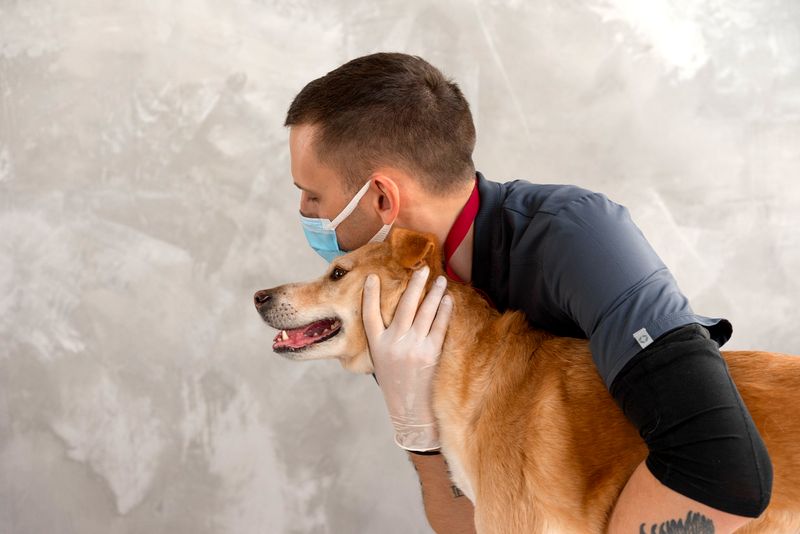What is the number 1 killer in dogs?

As a pet owner, you may be aware that certain diseases and conditions can affect your dog's health, but did you know that cancer is by far the number one killer in dogs? According to the American Veterinary Medical Association (AVMA), nearly half of all deaths in dogs over the age of 10 are attributed to cancer. This statistic underscores the importance of understanding this disease and its impact on our beloved pets.
Understanding Canine Cancer
Cancer, or neoplasia, is a group of diseases characterized by abnormal cell growth with the potential to invade or spread to other parts of the body. In dogs, cancer can affect any part of the body, including the skin, bones, lymph nodes, and organs.
Causes of Canine Cancer
The causes of canine cancer are multifactorial and may involve both genetic and environmental factors:
- Genetics: Certain breeds have a higher predisposition to specific types of cancers. For example, Boxers and Golden Retrievers are more prone to developing mast cell tumors.
- Environmental Factors: Exposure to certain chemicals, radiation, or environmental pollutants can increase the risk of cancer in dogs.
The Most Common Types of Canine Cancer
Cancer comes in many forms, but some types are more common than others. The most prevalent type is lymphoma, which affects the lymphatic system and is highly treatable when caught early. Other frequent types include:
- Mast Cell Tumors: These tumors can occur anywhere on a dog's body but are often found in the skin.
- Bone Cancer (Osteosarcoma): This aggressive cancer typically affects large and giant breeds, such as Greyhounds and Great Danes.
- Melanoma: A type of skin cancer that can be benign or malignant.
The Enigma of Canine Cancer
While medical research has significantly advanced our understanding of canine cancers, the exact cause remains elusive for many types. This uncertainty underscores the importance of early detection and regular veterinary check-ups to catch potential issues before they become life-threatening.
Recognizing the Signs of Canine Cancer
Early detection is crucial in treating cancer effectively. Common signs that your dog may be suffering from cancer include:
- Weight Loss: Unexplained weight loss can indicate an underlying health issue, including cancer.
- Lack of Appetite: A sudden disinterest in food or treats is a red flag that warrants immediate attention.
- Lethargy: If your dog seems unusually tired or inactive without explanation, it could be a sign of illness.
- Breathing Difficulties: Labored breathing can indicate internal issues affecting the lungs or heart.
- Lumps and Bumps: Any new lumps or bumps on your dog's body should be evaluated by a veterinarian.
Treatment Options for Canine Cancer
The treatment of canine cancer often involves a combination of surgical intervention, chemotherapy, radiation therapy, and immunotherapy. The specific approach will depend on the type, location, and stage of the cancer:
- Surgery: This is typically the first line of defense to remove tumors and prevent metastasis.
- Chemotherapy: Used to kill cancer cells and shrink tumors.
- Radiation Therapy: Targets specific areas with high doses of radiation to destroy cancerous cells.
- Immunotherapy: Boosts the immune system to help fight off cancer.
The Impact of Early Detection and Treatment
Early detection significantly improves a dog's prognosis. Regular veterinary check-ups, thorough examinations, and early intervention can make all the difference in managing and treating canine cancers effectively.
Maintaining Your Dog’s Health: Prevention is Key
In addition to regular veterinary care, there are several steps you can take to help prevent cancer:
- Healthy Diet: Provide your dog with a balanced diet rich in antioxidants and nutrients.
- Vaccinations: Keep up-to-date with vaccinations to protect against certain viruses that may contribute to the development of cancers.
- Avoid Environmental Hazards: Limit exposure to chemicals, pollutants, and other environmental toxins.
Conclusion: Empowering Your Dog’s Health Journey
Cancer remains a formidable challenge in canine health care. However, by staying informed about the signs of cancer, understanding available treatment options, and taking proactive measures to maintain your dog's overall health, you can significantly improve their quality of life.
Remember that early detection is key to successful outcomes. Regular veterinary check-ups, coupled with attentive observation at home, are essential in catching potential issues before they become serious threats.
